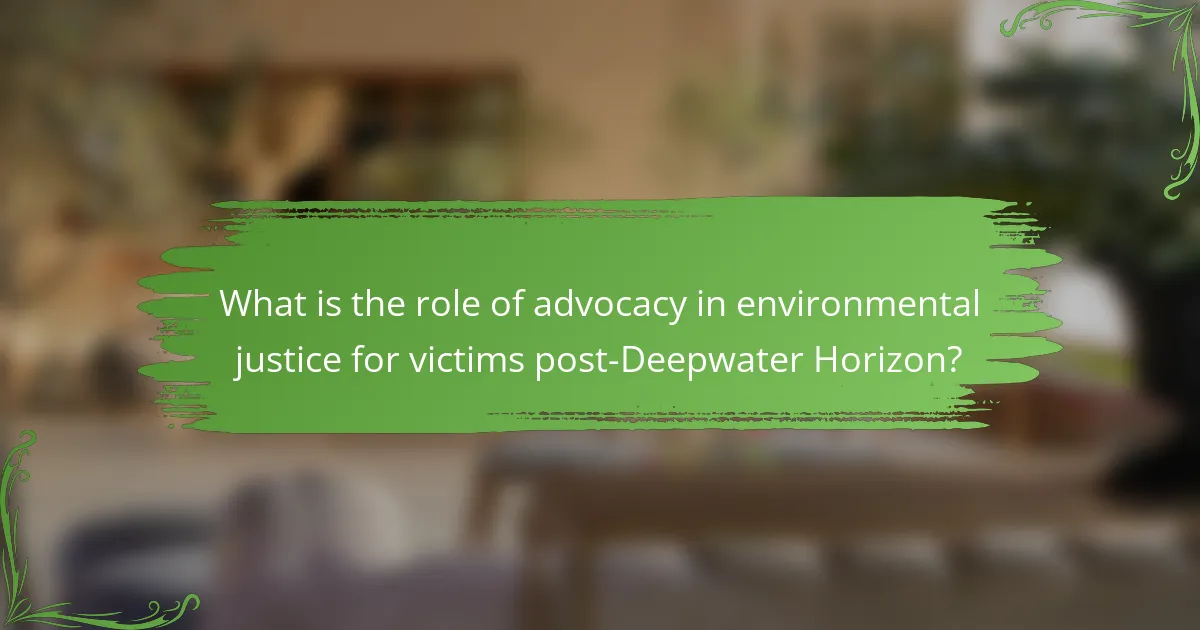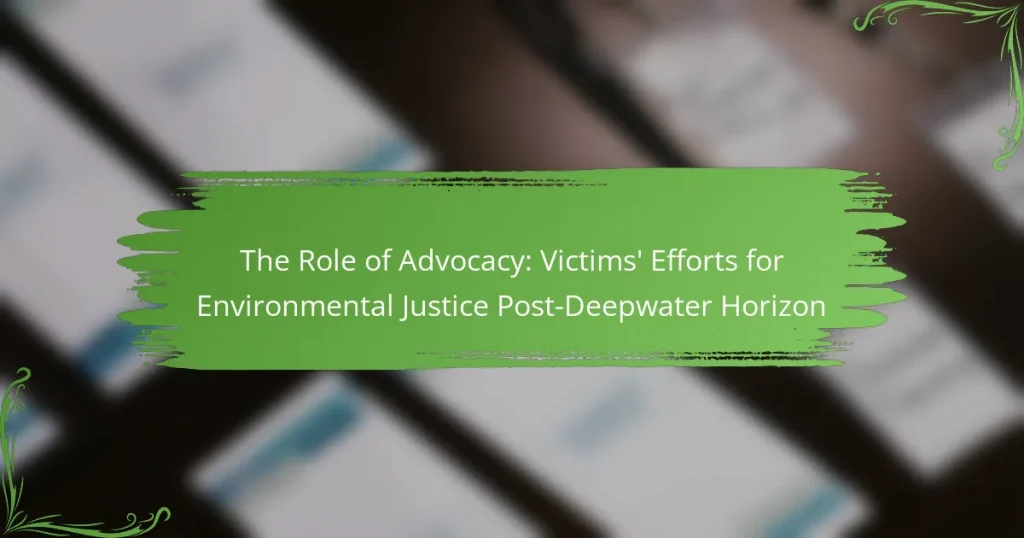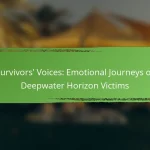Advocacy is a vital mechanism for achieving environmental justice for victims of the Deepwater Horizon disaster. This article explores how advocacy groups amplify the voices of affected communities, hold corporations accountable for environmental damage, and seek policy reforms to avert future incidents. It highlights the provision of legal representation to victims, which can lead to compensation for their losses. Additionally, the role of advocacy in raising public awareness about the disaster’s ongoing impacts and fostering community solidarity is examined, emphasizing its importance in empowering citizens to demand justice.

What is the role of advocacy in environmental justice for victims post-Deepwater Horizon?
Advocacy plays a crucial role in environmental justice for victims post-Deepwater Horizon. It helps amplify the voices of affected communities. Advocacy groups work to hold corporations accountable for environmental harm. They also seek policy changes to prevent future disasters. Legal representation is often provided to victims through advocacy efforts. This representation can lead to compensation for damages incurred. Furthermore, advocacy raises public awareness about the ongoing impacts of the disaster. It fosters community solidarity and empowers citizens to demand justice.
How do victims define environmental justice in the context of the Deepwater Horizon disaster?
Victims define environmental justice in the context of the Deepwater Horizon disaster as the fair treatment and meaningful involvement of all people in environmental decision-making. They emphasize the need for accountability from BP and other stakeholders. Victims seek restoration of their livelihoods and ecosystems affected by the oil spill. They advocate for equitable access to resources and recovery efforts. Many victims express that environmental justice includes addressing health impacts from the disaster. They highlight the importance of community participation in future environmental policies. Victims also stress the need for stronger regulations to prevent similar disasters. Their definitions are rooted in personal experiences and the long-term effects of the spill on their communities.
What specific environmental impacts have victims experienced from the Deepwater Horizon spill?
Victims of the Deepwater Horizon spill experienced significant environmental impacts. These impacts include the degradation of marine and coastal ecosystems. The spill released approximately 4.9 million barrels of oil into the Gulf of Mexico. This led to extensive damage to habitats, including marshlands and coral reefs. Wildlife, such as fish and birds, faced severe health issues and population declines. Contaminated waters resulted in long-term effects on local fisheries. Additionally, the spill affected air quality due to volatile organic compounds. The environmental destruction has had lasting implications for local communities reliant on these ecosystems.
How do victims articulate their needs and rights regarding environmental restoration?
Victims articulate their needs and rights regarding environmental restoration through formal claims and community advocacy. They express their concerns in public forums and legal settings. Victims often collaborate with environmental organizations to amplify their voices. They utilize social media platforms to raise awareness and gather support. Victims may also participate in surveys and studies to document their experiences. Reports from organizations like the Environmental Protection Agency highlight these articulations. Such efforts emphasize the importance of community involvement in restoration processes. Victims seek acknowledgment of their rights to a clean environment and fair compensation.
Why is advocacy crucial for victims seeking justice after the Deepwater Horizon incident?
Advocacy is crucial for victims seeking justice after the Deepwater Horizon incident because it amplifies their voices and needs. Victims often face complex legal and bureaucratic challenges. Advocacy groups can provide essential support and resources. They help victims navigate the legal system effectively. Advocacy also raises public awareness about the incident’s impact. This increased visibility can lead to greater accountability for responsible parties. Moreover, advocacy efforts can influence policy changes to prevent future disasters. Studies show that organized advocacy can result in more favorable legal outcomes for victims.
What challenges do victims face in their advocacy efforts?
Victims face numerous challenges in their advocacy efforts for environmental justice. One significant challenge is navigating complex legal systems. Many victims lack legal representation, making it difficult to understand their rights. Additionally, victims often encounter financial constraints that limit their ability to pursue advocacy. Emotional trauma can also hinder their participation and engagement in advocacy activities.
Victims may face opposition from powerful corporations, leading to intimidation and discouragement. Limited access to information about the legal and advocacy processes further complicates their efforts. Moreover, victims often struggle to unite and organize effectively due to differing experiences and perspectives. These challenges collectively impede their ability to advocate for justice effectively.
How does public awareness influence the effectiveness of advocacy for environmental justice?
Public awareness significantly enhances the effectiveness of advocacy for environmental justice. Increased public awareness mobilizes community support and drives engagement in advocacy efforts. It informs the public about environmental issues and injustices faced by affected communities. This knowledge can lead to greater participation in campaigns and initiatives. Studies show that public pressure can influence policymakers to take action. For instance, the Deepwater Horizon oil spill highlighted the need for stronger regulations. Advocacy efforts gained momentum as awareness of the spill’s impact on communities grew. Consequently, informed citizens are more likely to hold corporations and governments accountable.
What strategies do victims employ in their advocacy efforts?
Victims employ various strategies in their advocacy efforts for environmental justice. They often share personal testimonies to highlight the impact of environmental disasters. This approach creates emotional connections and raises awareness. Additionally, victims collaborate with environmental organizations to amplify their voices. They participate in community meetings to discuss concerns and mobilize support. Victims also engage in social media campaigns to reach broader audiences. This method helps disseminate information quickly and effectively. Furthermore, they may lobby government officials for policy changes. This direct engagement aims to influence legislation that affects their communities. These strategies collectively enhance the visibility of their plight and drive action toward justice.
How do grassroots movements contribute to the victims’ advocacy efforts?
Grassroots movements significantly enhance victims’ advocacy efforts by mobilizing community support and raising awareness. These movements often provide a platform for victims to share their experiences. This sharing fosters empathy and solidarity among community members. Grassroots organizations can effectively influence policy changes by organizing campaigns and rallies. They also connect victims with resources and legal assistance. Research shows that grassroots efforts can lead to increased media coverage, amplifying the victims’ voices. This heightened visibility can pressure authorities to address injustices. Overall, grassroots movements play a crucial role in empowering victims and driving systemic change.
What role do legal actions play in advancing victims’ claims for environmental justice?
Legal actions are crucial in advancing victims’ claims for environmental justice. They provide a formal mechanism for victims to seek redress for environmental harm. Legal actions can hold corporations accountable for pollution and negligence. They also help raise public awareness about environmental issues. Successful lawsuits can lead to financial compensation for affected communities. Furthermore, legal precedents established through these cases can influence future environmental policies. For instance, the Deepwater Horizon case resulted in significant settlements and regulatory changes. Overall, legal actions empower victims and promote systemic change in environmental justice.
How can collaboration enhance advocacy efforts for victims post-Deepwater Horizon?
Collaboration can enhance advocacy efforts for victims post-Deepwater Horizon by uniting various stakeholders. These stakeholders include affected communities, NGOs, legal experts, and policymakers. Working together allows for the pooling of resources and expertise. This collective effort can lead to more effective communication and outreach strategies. For instance, joint campaigns can raise awareness about ongoing issues. Increased visibility can attract media attention and public support. Collaboration also facilitates the sharing of best practices and successful advocacy models. Moreover, it can strengthen legal cases through shared evidence and testimonies. Overall, collaboration amplifies the voices of victims and increases the likelihood of achieving justice.
What partnerships have proven effective in supporting victims’ advocacy initiatives?
Effective partnerships for supporting victims’ advocacy initiatives include collaborations between non-profit organizations, government agencies, and community groups. These partnerships enhance resource sharing and amplify the voices of victims. For instance, the collaboration between the Gulf Coast Ecosystem Restoration Council and local advocacy groups has led to significant support for affected communities. Research indicates that multi-stakeholder partnerships can improve outreach and provide comprehensive support services. This approach has been validated through initiatives like the Deepwater Horizon Oil Spill Trust, which has funded various victim support programs.
How do coalitions amplify the voices of victims in the fight for environmental justice?
Coalitions amplify the voices of victims in the fight for environmental justice by uniting diverse stakeholders. They provide a platform for victims to share their experiences and challenges. This collective representation enhances visibility and credibility. Coalitions often engage in advocacy efforts, lobbying for policy changes that benefit affected communities. They also facilitate access to resources and legal support for victims. By pooling resources, coalitions can conduct research and raise awareness about environmental issues. This increased awareness can lead to greater public support and pressure on decision-makers. Overall, coalitions create a stronger, unified front that elevates the concerns of victims in environmental justice movements.
What resources are available to support victims in their advocacy for environmental justice?
Victims advocating for environmental justice can access various resources. Nonprofit organizations like the Sierra Club and Earthjustice provide legal support and advocacy training. Government agencies, such as the Environmental Protection Agency, offer information and assistance programs. Community groups often organize local workshops and events for education and mobilization. Online platforms like Change.org enable victims to create petitions and raise awareness. Additionally, social media serves as a tool for connecting with broader networks and sharing experiences. These resources collectively empower victims to effectively advocate for environmental justice and address their concerns.
How can victims access legal support and guidance in their advocacy efforts?
Victims can access legal support and guidance through various channels. Legal aid organizations often provide assistance to individuals affected by environmental disasters. These organizations may offer free or low-cost legal services. Victims can also seek help from local bar associations, which may have referral programs for attorneys specializing in environmental law. Additionally, advocacy groups focused on environmental justice can connect victims with legal resources. Many law firms may take pro bono cases related to significant environmental issues. Victims should document their experiences and gather evidence to support their claims. Accessing these resources can empower victims in their advocacy efforts for justice.
What role do nonprofit organizations play in assisting victims with advocacy?
Nonprofit organizations play a crucial role in assisting victims with advocacy. They provide resources, support, and a platform for victims to voice their concerns. Nonprofits often offer legal assistance to help victims navigate complex legal systems. They also engage in public awareness campaigns to highlight victims’ issues. This raises community awareness and fosters public support for victims’ rights. Additionally, nonprofits can facilitate connections between victims and policymakers. They advocate for policy changes that benefit affected communities. Research indicates that nonprofit advocacy can lead to significant legislative changes. For example, post-Deepwater Horizon, organizations mobilized efforts to secure justice for affected individuals. This demonstrates the vital impact nonprofits have in empowering victims and driving systemic change.
What practical steps can victims take to enhance their advocacy efforts for environmental justice?
Victims can enhance their advocacy efforts for environmental justice by building coalitions with like-minded individuals and organizations. Collaborating amplifies their voices and increases impact. They should gather and document evidence of environmental harm, which strengthens their claims. Sharing personal stories can humanize the issue and attract media attention. Engaging in public forums and community meetings raises awareness and fosters dialogue. Leveraging social media platforms can help reach a wider audience and mobilize support. Participating in local government meetings allows victims to voice concerns directly to decision-makers. Lastly, seeking legal assistance can help in navigating the complexities of environmental laws and regulations.
The main entity of the article is advocacy in the context of environmental justice for victims of the Deepwater Horizon disaster. The article outlines the critical role advocacy plays in amplifying the voices of affected communities, holding corporations accountable, and facilitating legal representation for victims. It discusses how victims define environmental justice, the specific environmental impacts they have faced, and the strategies they employ in their advocacy efforts. Additionally, the article highlights the challenges victims encounter, the importance of public awareness, and the contributions of grassroots movements and nonprofit organizations in supporting their quest for justice.


